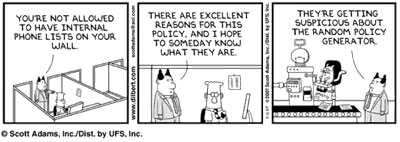This writing is free form and non-structured. If you feel offended after reading this post, that's just ‘cause you have no sense of humor or the article is about you.... and you my friend.... are a chump!
If you find yourself laughing along for most of the article but you disagree to some parts of it, that's probably because you are basically a productive human being but you've been spending too much time with people who are the central point of this article. You know.... the chumps!
Calling bullshit when I see it is my idea of humor. It's a little dark. A little over the top. And just about the only advice I can give you is don't take it too seriously.
You have been sufficiently warned. Continue reading at your own risk or close your browser window and leave now!
[This line is intentionally left blank.…to give you some think time to decide if you want to continue].
Still there?
Good!
Let's talk about Social Media.

But before we get to the social media bit, lets talk about the dudes who talk about Social Media with a straight face and claim to be "Social Media Experts".
I don't like the name Social Media Experts so for the purposes of this post we are going to give these folks a cute name.... the "Social Media Dudes" or SMDs. Or if you are like me and you like to keep things simple you can just call them... The Chumps!
In this article I am going to use these names interchangeably.
Most Self Proclaimed Social Media Experts = Social Media Dudes = SMDs = Chumps.
Got it? Clear? Sure? No Questions? Good! Let's move on.
Now that we have given a name to the SMDs, let start by talking about "Social Media".
I. What Is Social Media
"First There Was Print Media"
That's how the Chumps go about explaining Social Media when they talk about it. Most explanations about Social Media are on this line:
"Once upon a time there was the Print Media! Then there was Revolution and then came Online Media! And then there was the time for Revolution 2.0 and some really smart dude somewhere farted the term "Social Media" straight out of his B-hind and there was world peace…. And.... And now Social Media is there to Rule the world!"
It's a pretty compelling story. Especially if you are having a bad day and your mind is vulnerable to stupid memes and thought viruses. That's how all bad ideas that survive (including terrorism) spread. People are having bad days and they are confused, they listen to horse poop and before you know it they are doing stupid things like blowing themselves up. The "Social Media" virus is no different, albeit the story is compelling. You have to give them that.
Print Media > Online Media > Social Media.
That's the story Boy! Got that?
The only problem with this story is that I have been living on this same planet as most SMDs (a few of them are truly out of this world) and as far as I can say, there has never been such a thing as "Print Media". Nope! Never! Ever! Not on this planet!
There were things which we read. You know, books and that stuff. But we didn't take all of them an club them into a stupid bucket called the Print Media.
I mean I am sure that some smart dude somewhere farted that term out of his B-hind too and then realized that no one cared about it and enough people twitched their noses and looked at him with knitted eye brows which embarrassed the shit out of this dude and he stopped using the term Print Media all together and the world was saved from an idea epidemic. So yes, the concept of "Print Media" might have existed for a brief period of time.
But in the larger scheme of things as far as most of us were concerned, it wasn't even significant to be noticed by most people on this planet and therefore it is safe to assume that such a tern as Print Media never existed.
I'll tell you what did exist and still does and will continue to exist (at least for a very long time).
Since the renaissance and the invention of the printing press, we had News Papers and Magazines and Journals. Since then, a News Paper was a News Paper, a magazine was a magazine and a journal was… well… a journal! There was no such term as the "Print Media". Nada! Zip! Nothing at all! Honest! I've been alive for more than 29 years! I've never heard the term "Print Media" to describe a freaking newspaper. Not until the SMDs started showing up on Twitter. Then suddenly I started hearing it everywhere and then it spread like a virus.
Now every time someone asks me "Hey Pops! What are you reading!" I feel the immediate urge to respond with "Oh! Nothing! Just Some Print Media!"
Every time a SMD says "First there was Print Media" with a straight face, he is just full of shit.
Oh and while we are at it, let's also talk about the "Online Media" and "Web 2.0" (though I suspect that is a completely different breed of chumps who deserve a blog post unto themselves, but let's give them just a little bit of love for now. Why should they feel completely left out and ignored? That's so not fair!).
Given that I am starting to feel bad about having to bash everyone today and being so blunt and direct and loud and realistic about things, let's get Tim Berners Lee to do the honors:
When asked if it's fair to say that the difference between the two might be fairly described as "Web 1.0 is about connecting computers, while Web 2.0 is about connecting people," Berners-Lee replied, "Totally not. Web 1.0 was all about connecting people. It was an interactive space, and I think Web 2.0 is of course a piece of jargon, nobody even knows what it means. If Web 2.0 for you is blogs and wikis, then that is people to people. But that was what the Web was supposed to be all along. And in fact, you know, this 'Web 2.0,' it means using the standards which have been produced by all these people working on Web 1.0." He's big on blogs and wikis, and has nothing but good things to say about AJAX, but Berners-Lee faults the term "Web 2.0" for lacking any coherent meaning.
Read between the lines?
What the founder of the world wide web is telling you, is that the Online Media Dudes (OMDs) and the Web 2.0 media dudes (OMDs 2.0) are…. Chumps too!
During the short span of time in which software development as we know it, has existed, there have been a truckload of jargons that have been farted out by a truckload of guys. Some dissipated into thin air. Others like these ones stuck around and continue to stink.
Pretty much like "Print Media", there is no "Online Media" or "Web 2.0" or "Social Media" that is going to change the world.
Of course, there were, and still are, websites, chat rooms, search engines and web applications (like forums, blogs etc.). A website was and still is a website, a chat room was and still is a chat room, a search engine was and still is a search engine, a forum was and still is a forum, a blog was a and still is a…. I think you get the idea!
The SMD's, OMDs and OMDs 2.0 were and still are all bullshitting!
And you are eating their bullshit (gobbling it up) especially if you use words like The Print Media, The Online Media, The Social Media and Web 2.0 with a straight face and claim to be an expert at this game.
We've done a bit of rambling on till now. Lets start getting to the specifics of my criticisms of "Social Media" and where Chumps are taking it.
II. Where Is The F@#king Value?
Somewhere in the mid 1940's there was a really smart lady called Ayn Rand who wrote a book about Architects called The Fountainhead where she used the term the "Second Handers". The chapter where the hero of the novel talks about this idea was a long rant, pretty much like this blog post, but I'll save you the trouble of reading over a thousand pages and cut it down for you.
Second Handers are parasites. People, who mutilate, violate, steal, twist and take credit for the innovators hard work.
The whole "Social Media" movement and the poop that you see getting posted about Social Media is a "second hander movement".
Seriously! Think about it. What do most Social Media Dudes out there really do? They get on a Social Media website and talk about how cool Social Media is. It's information about information. Forget the part about building systems or tools. These guys aren't even building data.
Geeks like me refer to this as Metadata!
No one is producing anything valuable or concrete here.
Folks are:
Blogging about Blogging.
Tweeting about Tweeting.
Blogging about Tweeting.
Tweeting about Blogging.
Posting Questions like "Is Facebook Hotter than Quora?" on…. Quora!
I've got a question that you ought to ask on Social Media: Where is the f@#king value-add happening? What are you building again? What is the percentage of people using the "Social Media" that are doing any "real work" and producing genuine value with it?
And No, Random Meta data or noise and tools to handle that same Metadata or noise effectively so that you can produce more metadata and more noise is not genuine value!
We had a name for this before we started calling it Social Media. We called it "Small Talk". All of us did it. But we were aware of the dangers of overdoing it. Then we had the tools to take it online so we started doing it online which was all fine and dandy. Then someone came in and said it was the "Social Media" and doing more of it can make you rich or help you get laid and suddenly the dam walls gave in and then there was…. REVOLUTION!
Now we have everyone trying to create a revolution by talking about how bad that restaurant down the corner is. That's how we are going to have revolution. Not by putting in the hours and building stuff that's genuinely meaningful, helpful, valuable and touches lives.
Yeah. Right!
III. Word Of Mouth
"Dude! Social Media is Hot! I know which movie I should not watch and which brand of Toilet Paper to use ‘cause my friend tweeted about it!"
Ok we can't beat you at that. So I am going to tell you a little story instead. Back in our school days we had a dorky little guy who loved whining. We're going to call this guy Freddy. Freddy loved to whine about everything. Freddy loved soap operas. Freddy loved the Charmin Ultra Strong toilet papers and he absolutely hated his cell phone company ‘cause those guys were mean to him and they deducted his balance ‘cause he paid the bills late and Freddy had a dog and Freddy loved…. (YAAAAWWWN! Yeah. I know).
Now get a million Fredies on Twitter and ask them to bitch their hearts out and you can be rest assured that you are going to find thousands of tweets by thousands of Freddies when you are searching for the #toiletpaper hashtag on twitter desperately hoping you would find advice on which toilet paper to buy on Twitter. Or let's just say that you are already following Freddy and when he tweets about the Charmin Ultra Strong toilet paper being uber cool you just get that Tweet and you become that much smarter about…. Toilet Papers.
(Side Note: Knowing which toilet paper Freddy likes in a 140 character blurps isn't really directly correlated to your level of knowledge on Toilet Papers, but let's give that leeway to Freddy and the Social Media Dudes for now and let's assume for the time being that 140 character blurps on Toilet paper are really making you the smartest Toilet Paper expert in town).
What this means is that you would have to follow a million Fredies and hear about Toilet Paper all the time to effectively utilize word of mouth online. Or you could just Google for Toilet Paper Brands and land here and read the 14 ratings and 13 reviews on….. You guessed it… The Charmin Ultra Strong! Exactly what Freddy was going to recommend!
I don't know about you but I prefer the later, but maybe that's just ‘cause I am not a chump!
You know what's word of mouth? True Mavenship is word of mouth. People like Seth Godin, Scott Hanselman, Scott Berkun, Jeff Atwood, Malcolm Gladwell (the list is really endless) do this. I've talked about this before and it involves developing a specialization, honing a talent, working at it, paying your dues, giving in the 10,000 hours, adding genuine value before people start respecting you and listening to you.
That's true communication and connection and word of mouth. Of course no one worth following on Twitter seems to be making a big deal about how "Social Media is going to bring a revolution and how it is going to change the world".
They are all busy adding value and earning your respect. They are busy doing hard work, while the chumps throw Metadata on your face and tweet away to glory.
IV. Everything Is Connected.
This was something someone who might prefer to stay unnamed said over a phone conversation. "You know, if I give you a map and plot two points on it and ask you to connect those two points with a line, how hard would it be to connect those two points? If you want to connect things, everything is connected."
That Toilet Paper Review site that I mentioned above, I can see a zillion SMDs shouting at the top of their voices saying "Pops! No Fair! That Toilet Paper site is Social Media!"
Yeah. Right.
Everything with a comment field and a rating hyperlink is Social Media. I've given you the map with lots of points on it. Just keep drawing the f@#king lines and together we can change the world! We love you! Chumps!
The only genuine threat with drawing these lines is that when you blow your stupidities out of proportion, some famous publishing house picks up your poop, publishes it and before you know it Enterprises are talking about building the next Toilet Paper Social Media 4.0 website using Web 8.0 with a like button and planning on minting millions by building their toilet paper iPhone application and giving it out for free. And then these enterprises go out there and invest a zillion dollars on the iPhone application and a Toilet Paper Service only to find out that while a lot of Freddies were tweeting about Toilet Papers they weren't really passionate enough to yank out a ten dollar monthly subscription to find out more about Toilet Papers. And then you have failed startups and people lose jobs. Nasty things happen.
Congratulations Chumps! You just f@#ked an entire organization and wiped it out of existence by producing Metadata. Or let's just say it was the Organization that blew themselves up. That's what nasty thought memes do when you allow them to spread.
Everything is in fact connected. Let's draw more lines.
Everything is Social Media! Yeah! Right!
Remember the terrorism bit we talked about when we started this post? Yeah. That's what really bad memes do when you allow them to spread.
V. No Silver Bullets.
I realize that I've been rambling on for about eight pages and it's time I start tying the loose ends and making my points. Every time anyone produces a technology that has the potential of making an impact, we have "Second Handers" who want to jump on the bandwagon and the only contribution they have to offer is a sick and twisted name, lousy noisy publicity and random mutilation of the idea. That's how silver bullets come into existence.
Google produced a grid of computers which formed a truly scalable infrastructure. Amazon gave out a part of their infrastructure for a small fee. The Chumps and the second handers called it Cloud Computing and convoluted the whole idea by making way too much premature noise about it. Folks worked hard on building Ajax frameworks and the second handers were coin the term Web 2.0 and confuse the crap out of everyone to a point where anything with big fonts and lesser page refreshes was Web 2.0. Genuine builders work on deep innovations which have long term impact. Chumps create random premature silver bullets out of these innovations.
The problem with silver bullets is that they are poison for the confused mind. Most geeks are safe. They have bullshit busters pre built in their heads. These bullshit busters help them steer clear from that automated code generation tool that is going to boost their productivity 10x and make them 10 times more sexually desirable. As geeks we listen to this crap and dodge this crap 10 times a day. So when we hear about Social Media we go "Bleh! Whatever!" and then we forget it and we get on with our lives. Yes, we have our Twitter accounts and our Facebook friends but we know where to draw our lines and how far to take this shit.
But Geeks don't run enterprises and fortune 5000's. Enterprises are run by management teams which desperately want a silver bullet. Every time you post some poop on how Social Media is hot and how it is going to change the world, you run the risk of some innocent reporter with an overused bugged bullshit buster picking it up and running it on an online publication which is read by thousands of people. Most people are going to boo that report and your post. They are going to leave nasty comments on your blog post and then get on with their lives assuming that the reporter was just having a bad day and ended up putting some really bad content out there. But really bad publicity is also publicity and that's going to get you on Reddit and even more popular publications.
And then you are going to have an innocent Vice President of a Toilet Paper Company with really weak bullshit busters, who truly believes in the authenticity of these publications along with the content they put out and doesn't understand that authorship doesn't always equal authority. This Vice President is going to glance through that article, run right past the comments and the booing (we often run past invisible gorillas and often make the lamest of mistakes) and is going to decide to invest in creating a social presence for his toilet paper company and hire more Chumps to help him do that.
The vicious circle is complete. Supply of horse poop now meets demand of horse poop and we have a freaking market! Repeat that a few thousand times and you have an economy. It's really that simple. And then suddenly you are left with all this horse poop and you don't know what to do with it.That by the way is exactly where we are right now. We have an entire economy of Second Handers Tweeting, Blogging and Producing Metadata that solves no problem and just creates noise.
Repeat the same cycle for long enough and you're going to create a colossal f@#king disaster. The kind where companies wind up and people lose their jobs. Even worse is the kind of disaster where every genuine idea and effort capable of having a long term impact is mutilated and taken over, twisted and relabeled by a bunch of chumps or second handers before it can have any impact.
VI. Call to Action
If you are in the business building communication tools that build on Facebook or Twitter, here is your opportunity at not being a chump. Try to inspire people, build genuine content on a variety of topics, build stuff (applications, tools) which reduce this noise, boo at bullshit when you see it and make sure your boo's are loud enough to be heard. After all you are in the Social Media business with a million followers. You can be loud!
Start out by helping people spot the signals within the noise, educate people; and please…. please stop producing random meta data, using words like REVOLUTION and for your own sake stop building stupid presentations like these ones. If you do, we are just going to have to call bullshit on you.
If you are a geek with bullshit busters that can pick up crap like this, buzzers that start sounding when you hear bullshit, noses that start twitching when you smell someone farting utter crap, or eyebrows that knit when you hear a lousy idea, going "Bleh! Whatever!" and moving on with your life, is no longer the right approach. Show your perspective to everyone else. Educate people. Help them develop better bullshit busters in their own heads.
Help them realize that there is no silver bullet out there that is going to change the world and trying to look for one that is going to just change their world in a very strange nasty way.
Put simply, use your Social Media skills to blow the Social Media out of people's mind. There is no Social Media. You have blogs, and applets and web applications and websites and people talking to each other and small talk and.... Chumps. Lots of them.
As long as you can see that clearly, we are good.
Now go to Twitter or Facebook and spend a couple of hours there and then when you are entertained, have built a community, have talked to friends, taken your customer's feedback, talked to them or done whatever it is that you were trying to do there get back to doing some real work.
Try to go slow on the metadata production. Stop being a chump and please.... please build something meaningful. Something insightful. Something inspiring. Something that solves a real problem that you have. Something that helps people discover new information that transforms them or changes their lives. Something that helps people become more effective or makes them better human beings.
Oh and by the way, if you bump into some Social Media Dudes tell them I said Hi! Tell them to follow me on Twitter and we can send each other tweets. I am on twitter when I have nothing else to do. I think of it as a video game where I poke random strangers and they poke me back and I would love to poke a few chumps and be poked back if it gets me a higher follower count and more mussel power. Social Media is going to change the world! Let there be world Peace!








Comments are closed.